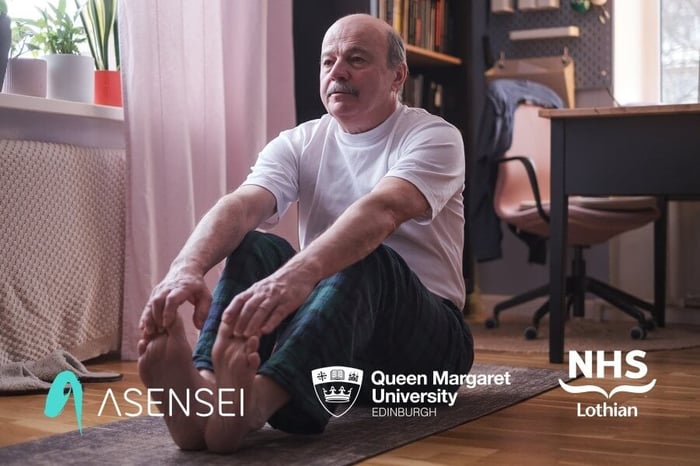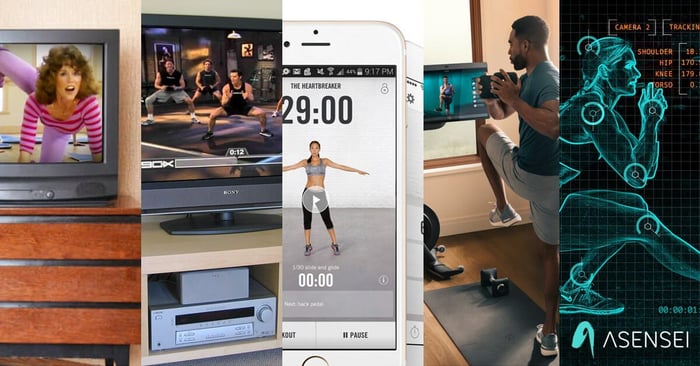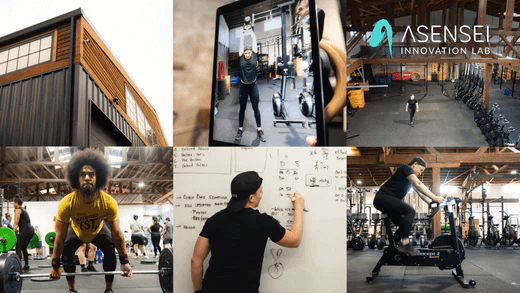ASENSEI is partnering with NHS Lothian and Queen Margaret University in a study aimed at improving patient surgery outcomes and reducing cost of care through prehabilitation as part of Scottish Government’s Digital Health and Care Strategy.
San Francisco, CA @ November 8, 2022
ASENSEI, the company offering the easiest way to add form tracking and personalized coaching to health and fitness products, is proud to be selected by NHS Lothian to demonstrate the feasibility of providing pre-operative care to patients through digital delivery of pre-habilitation programs designed by the physiotherapy team at Queen Margaret University.
Pre-habilitation has been shown to prevent or reduce complications following surgery. By giving patients the functional reserve to withstand the stresses of surgery, there are 3 key benefits to both patients and the health service providing their care:
Improved surgical outcomes, including a reduction in the rate of post-operative complications.
A reduction in the length of time patients are required to stay in hospital post surgery
A reduction in the associated hospital costs
Graeme Couper, Consultant Surgeon at the Royal Infirmary of Edinburgh explains the challenges associated with delivering pre-habilitation at scale. “With over 18,000 patients a year nationally who could benefit from a pre-habilitation program, we would require an additional 18 hours per patient of additional physiotherapy to meet the need, plus the associated healthcare facilities, which is cost prohibitive. Patient travel to the healthcare centre is not always feasible either.”
Dr Lisa Salisbury, Physiotherapy lecturer at Queen Margeret University adds, “This is why we applied through the Technology Enabled Care (TEC) program to demonstrate the feasibility of using ASENSEI as a key technology to deliver at-home prehabilitation that can be personalized to suit the patients underlying condition and fitness.”
The TEC Program is part of the Scottish Government’s Digital Health and Care Strategy, focused on developing citizen facing solutions where “outcomes for individuals in home or community settings are improved through the application of technology as an integral part of quality, cost effective care and support to look after more people at home”.
ASENSEI’s founding team includes 2 Scottish entrepreneurs - Steven Webster and Ross Arnott - who met in the early 1990s as students while studying in the Department of Informatics at University of Edinburgh. Headquartered in California, ASENSEI has a Design, Engineering and Data Science team in Edinburgh.
“There are a number of challenges facing at-home physical therapy, that ASENSEI is uniquely positioned to solve, “ says Arnott, Chief Product Officer at ASENSEI. “First, is adherence - encouraging people to follow their program in the first place. Even for hospital based delivery of cardiac rehabilitation where there is strong evidence of efficacy, attendance can be as low as 30-50% of people. Second, we all forget what we’re supposed to be doing and how to do it correctly. And that makes the problem of adherence worse. ASENSEI technology solves all of these problems.”
The ASENSEI software development kit (SDK) makes it easy for health and fitness apps to integrate innovative capabilities that include:
Mobility Assessment - passively observe how well a patient is moving through different ranges of motion, allowing exercises to be tailored and improvements to be observed.
Tracking and Logging - automatically count and record each repetition or performance of an exercise, removing a user frustration for patients, and monitoring adherence for care providers.
Real-time feedback - ensure patients are practicing exercises safely and correctly by monitoring and correcting their form in real-time.
Guided Learning - lead individuals step by step through their physiotherapy program, stopping to teach them new or unfamiliar exercises step-by-step, the same way an in-person trainer or therapist would.
Personalization - adjusting the challenge and difficulty on a day-to-day basis based on observing difficulty and correctness of performing exercises.
“ASENSEI is a world-leader in 3D motion capture and human movement recognition, using the cameras on our phones or sensors embedded in our sports clothing, “ says Steven Webster, CEO of ASENSEI. “In the US, we are integrating our technology into leading healthcare platforms like AMP Recover to offer movement screening, guided prehabilitation programs and measurement of adherence to the 80% of the global workforce who are desk-less in a physically demanding job. We are delighted to be applying these learnings to the Digital Health and Care Strategy with our partners at Queen Margaret University and NHS Lothian”
The ultimate goal is to demonstrate that prehabilitation programs can be more widespread, more effective and more cost-effective when delivered digitally.
"Prehabilitation programs are relatively rare, with cost of delivering physiotherapy being the major barrier“, adds Couper from NHS Lothian. “Being able to deliver these programs digitally, within the narrow window of opportunity between say a cancer diagnosis and planned surgery, while helping patients avoid lengthy commutes and the higher risk of COVID-19 related infections before surgery, could deliver a better level of care, to more people, for less cost. We’re excited for the results of this feasibility study, and for the partnership with Queen Margaret University and ASENSEI.”
For further information on ASENSEI’s technology for Connected Health, visit www.asensei.ai
---
ABOUT ASENSEI
ASENSEI.AI is the human movement recognition platform that is the easiest way to add form-tracking and form-tracking powered experiences to Connected Health and Fitness products.
Companies of all sizes use ASENSEI’s software to motion-capture their customers in real-time, recognize and understand their quality of movement and deliver personalized digital experiences.
ASENSEI.AI is the most widely deployed solution for 3D Computer Vision and Connected Apparel, running on high- powered phones or low-powered consumer electronics, using single or multiple cameras to capture individuals at home or in a room full of participants.
Find out more at: www.asensei.ai
ABOUT NHS LOTHIAN
NHS Lothian provides a comprehensive range of primary, community-based and acute hospital services for the populations of Edinburgh, Midlothian, East Lothian and West Lothian in the UK.
NHS Lothian also provide some services for patients in the Borders and in Fife and are a national centre of expertise for some specialties provided to people across Scotland. NHS Lothian has an annual budget of £1.6 billion and employs approximately 26,000 staff.
Find out more at: www.nhslothian.scot
ABOUT QUEEN MARGARET UNIVERSITY
The School of Health Sciences at QMU offers the largest range of professional health pre-registration programmes of any university in Scotland and is ranked in the top 20 of UK universities for subjects allied to medicine in the Times and Sunday Times Good University Guide 2022. The School leads the way in ‘person-centred’ approaches to health that have been led by the Division of Nursing and The Centre for Person-centred Practice Research. Person-centred nursing at QMU is internationally recognised, and in the recent Research Excellence Framework (REF 2021) 100% of QMU's research impact in Nursing and the Allied Health Professions was rated as world-leading or internationally excellent.
Find out more at: www.qmu.ac.uk
ASENSEI is proud to be working with the National Health Service (NHS) Lothian and Queen Margaret University in the delivery of a study for home-based prehabilitation.
🚑 Over 18,000 patients a year could benefit from improved surgical outcomes, and a reduction in the length of time they are required to stay in hospital post surgery.
❤️ Even for hospital based delivery of cardiac rehabilitation, where there is strong evidence of efficacy, adherence to prehabilitation programs can be as low as 50%.
👩⚕️ Meanwhile, an at-home prehabilitation solution powered by ASENSEI can reduce the prohibitive costs of care pre-surgery, and the associated hospital costs for patients post surgery.
This study to deliver personalized pre-habilitation programs powered by ASENSEI is funded in part by the Technology Enabled Care (TEC) program which is part of the Scottish Government's Digital Health and Care Strategy.
We are delighted to partner with NHS Lothian and QMU to "develop citizen facing solutions where outcomes for individuals in home or community settings are improved through the application of technology .... to look after more people at home".
ASENSEI.AI is the easiest way to add form-tracking and form-tracking powered experiences to Connected Health and Fitness products.
To find out more about our solutions for pre-habilitation, rehabilitation and MSK injury recovery please reach out to Blake Whitcomb, VP of Partnerships and Sales.




